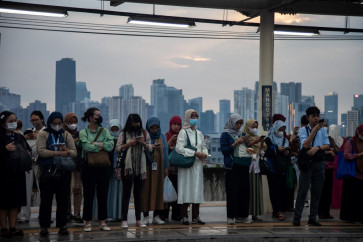Popular Reads
Top Results
Can't find what you're looking for?
View all search resultsPopular Reads
Top Results
Can't find what you're looking for?
View all search resultsHuge opportunity from Japanese investment
In mid-July, the Japan Credit Rating Agency, Ltd
Change text size
Gift Premium Articles
to Anyone
I
n mid-July, the Japan Credit Rating Agency, Ltd. (JCR) raised Indonesia’s rating to investment grade, which reflects growing confidence in the management of Southeast Asia’s largest economy, which has proved resilient.
This is certainly great news for Indonesia, as investment grade rating will boost the confidence of foreign investors in the country, especially since this step is expected to be followed by international rating agencies. Analysts have also said that Indonesia “may be able to get cheaper funds from Japan”, which is its largest creditor.
In a recent visit to Japan, we met with a number of Japanese businesses and attended seminars where we gained insight into the perspective, understanding and expectations of Japanese businesses on investment in Indonesia.
They are generally very eager to invest in Indonesia, given its vast population, relatively cheap labor, increasing GDP level and the strength of its economy, which grew 4.5 percent last year, making it the fourth largest in Asia, despite the global economic downturn.
This eagerness is also due to the shrinking domestic market because of an aging society. The number of people aged 65 or older hit a record high at 22 million, or one in six people in 2009. The labor force population is decreasing at a rate of around 200,000 every year.
Child birthrate was one of the lowest in the world with 7.64 births per 1,000 people in 2009, which means that the Japanese population is decreasing. If the situation continues, the Japanese population is estimated to be halved by the end of this century. Japanese businesses desperately need a new market, especially markets where mid and long term growth are expected.
Japan has been investing in Indonesia for a long time, particularly in automotive, electronic goods and the energy and mining sectors. For Japanese businesses, Indonesia has been the place for low-cost manufacturing as well as the source of various natural resources. In Indonesia, there are about 1,000 Japanese companies which employ approximately 300,000 people.
There is a new trend. Thanks to the increasing income, great population and growth in consumer goods consumption in Indonesia, the area of investment is no longer limited to “traditional” sectors but now also covers retail, media and consumer product sectors.
Japanese restaurant chains (Ootoya, Yoshinoya, Ebisu Curry), minimarkets (7-Eleven), fashion and household appliances (MUJI) have recently emerged on the market in Indonesia. Taisho Pharmaceutical recently acquired Bristol Myers Indonesia. There are many more potential Japanese investors in the pipeline.
The investment of these new players is supported by the successful stories of several Japanese companies. While we stayed in Japan, Nikkei Shimbun, Japan’s most widely circulated daily business paper, reported on Ajinomoto’s plan for a new US$50 million factory in Indonesia.
The new factory is aimed not only at domestic market but also at export to Middle East countries and Pakistan. This news implies that there would be more Japanese businesses which regard Indonesia as a production and export base for halal goods.
Another media source recently wrote about the success of Yakult. Yakult sells millions of bottles per day and provides income to thousands of Indonesian women through the “Yakult Lady” sales force.
Pocari Sweat (Otsuka Pharmaceutical) and Gatsby (Mandom) have also become well-known, successful business cases.
Many Japanese business people have now become aware that Indonesia is a country full of business opportunities, and not a country of political and economic turmoil, natural disasters, and uncontrollable infectious diseases. Perception has changed substantially.
Still, this improved image and the higher expectations in Indonesia will not promise an automatic influx of investment from Japan. Business leaders are always looking for better opportunities and a better business environment.
A comparison with other countries would give us some useful insight into this. Actually, the number of Japanese investments in Indonesia still lags far behind Thailand.
Thailand has as many as 7,000 Japanese companies. They are still attracting many Japanese investors despite the recent political turmoil in Bangkok. Key reasons for this are 1) a clear program and incentive scheme for foreign investors, especially for strategic sectors, 2) well facilitated infrastructure, 3) the variety of supporting industries and services.
By contrast, among the factors that have been the major source of concern and complaints from Japanese businesses in Indonesia are its lack of infrastructure, transparency, laws and regulations. The most pressing issue is law enforcement in the area of taxation. Although most Japanese companies intend to comply with all the regulations, including those concerning tax, the Indonesian authorities often hold a different view. During our trip to Japan, we heard many concerns about these matters. No investor likes uncertainty.
If these obstacles are not solved, Indonesia will lose a huge potential from Japan investors. As mentioned earlier, Japanese companies are eager to expand overseas, and this does not only concern huge businesses, but also second tiers of companies, the middle size companies and domestic players that are also considering foreign investment.
There is also another opportunity up for grabs for Indonesia in regards to Japanese investment. Despite the need for further expansion, Japanese companies lack human resources as the productive age group is decreasing in size.
Many of those in this age group are not very good at speaking English and are very used to living in a homogenous society, which is not very beneficial in terms of effective leadership in overseas business.
This gap can be filled by Indonesians working in Japanese companies at the managerial level and as skilled labor, not only in Indonesia but also abroad.
There are a lot of hopes concerning investment by Japanese businesses in Indonesia, but there are great concerns as well. If the latter can be settled, it will secure future collaborations and mutual benefits for both countries.
Ade Elimin is a partner, and Shunsuke Wariishi is a technical advisor at PricewaterhouseCoopers Indonesia.










